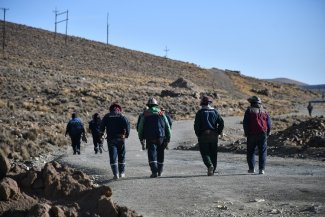14-year-old Fatima Kanju (on the right) attends English classes organised by Small Projects Istanbul (SPI), in Istanbul, 13 August 2018.
Mona tries to remember the times she was nearly killed in the classroom, as a student and as a teacher. The 22-year-old, who graduated in English from Idlib University in 2017, prefers to use an alias for her own safety.
“We’ve had air strikes at the school. Of course, we’re scared to death when it happens. We all start screaming and crying and try to get the kids back home. We have no way of protecting them in my school, we can only send them home,” explains Mona via a weak internet connection and Whatsapp calls from Idlib province, the last stronghold of the Syrian opposition in the northern part of the country, on the border with Turkey.
Her school has been spared since the start of the new academic year. But between August and September three schools in the province were the target of bombings by the regime, supported by Russian fighter jets: on 8August, in the capital, Idlib; on 4 September, in Jisr al-Shughour, where a market in Mhambel and a school in Al-Badriya were attacked. And on 10 September, a school in Jarjanaz, was hit, killing nine civilians, mostly children, according to opposition sources.
The United Nations began monitoring the deaths of children in Syria in 2014. Since then, until mid-2018, the UN Office of the Special Representative of the Secretary-General for Children and Armed Conflict has been able to verify and confirm 3,130 child deaths, although the organisation fears the figure may be much higher.
According to the Syrian Network for Human Rights, almost 28,000 minors have been killed since the outbreak of the war in Syria in 2011.
“Not all of the students are afraid. Some of them are so strong that they no longer care about the bombings. But others get very nervous when they hear the sound of the planes,” explains the young woman, now the teacher of around 100 pupils aged between 15 and 17. “Suddenly the planes begin to arrive. We hear them, we know we are in danger because our hearts start racing. We keep quiet and I try to stay in my place. Sometimes I don’t know what to do. But then the person in charge of the school comes and sends us all home. It’s the only thing we can do.”
Mona says they have been lucky this year. Since mid-September Turkey and Russia reached an agreement that has halted the Bashar al-Assad regime’s bombing of the opposition stronghold in Syria’s north-west. “I think it has been a good solution for Idlib and other areas, but we don’t know how long it will last,” she adds.
The main dangers for students and teachers are the bombing, she says, the lack of security; followed by the shortages and the power cuts. She still remembers the first time she was caught in a bombardment. “It was my third year [in 2016]. I was on my way to university. The plane was right above me, I was scared to death, I thought I was going to die there and then. Some girls started running, others started crying. I was nailed to the ground, I didn’t know what to do – whether to run or stay still. It’s very difficult. You know that death is near. I decided to help a friend of mine who was pregnant.”
When the bombings and the arrests at checkpoints began, after the Free Syrian Army (FSA) took control of the province, there were weeks when she had to stay in the city, in shared apartments with other students, and could not get back to her village. They studied by candlelight and took turns to go out for food.
Lessons and decisions of this kind are not common in the rest of the world.
Getting an education, in spite of everything
Mona found the strength to start and finish her studies in the middle of the war: “I had dreamt about getting a degree ever since I was little. I ignored all the problems to pursue my dream. I cried, I tried, I walked, I studied, I feared...but, deep down, I knew that my dream was stronger than any difficulty.”
It is a dream shared by 14-year-old Fatima Kanju, who attends English classes run by Small Projects Istanbul (SPI), 1200 kilometres away, across the border.
“Hello, my name is Fatima, I am 14 years old. I am studying 8th grade in Arabic school. I come from Syria, now I live in Istanbul,” repeats the young girl during her English class. The English course for refugee children takes place during the summer at the SPI building in the Mevlanakapi neighbourhood, next to the old city walls.
SPI, together with Turkey Volunteers, have been organising this summer course since 2014. They pay the pupils’ parents 500 Turkish liras a month (about US$86), slightly less than a child, exposed to illegal exploitation and ill-treatment, would earn if sent to work in a factory for the summer. This payment also helps save the parents from marrying off their underage daughters as a way out of economic hardship.
There seems to be little risk of this happening to disciplined young Fatima. Five years after they fled Aleppo [in 2013], her memories of the war are limited but indelible: “There were noises that were very scary. I remember a lot of bombings, and so many people dying in al-Shaar,” an area then in rebel hands in western Aleppo.
The girl missed a year and a half of school, as of her second grade. She is now in seventh grade at an Arabic school in Istanbul, where they stopped giving English classes in the last year. “I heard they were teaching English here. My dream is to be a doctor when I grow up, so I have to study hard and learn English. That’s why I come here,” says the young girl after class.
“If I hadn’t come here during the summer, I’d be studying English at home using apps. My parents are very happy with this and want the best for me and my sister,” says Fatima, with a smile.
Australian Karyn Thomas, one of SPI’s founders, says that most of the 22 students they have had in the summer usually work in factories and, in the case of girls, were at risk of being married off.
“We take them out of the factory and back to school. This also helps to delay a possible marriage. What they do is come here during their holiday period to learn English, and then they go back to their Turkish school in September,” Thomas explains. In the Arab world, marrying off a daughter can provide a very desperate way out for families in need. “So, by paying something to the families – those who really want their children to get ahead – we help delay child marriages and avoid health problems or premature births. If there’s one thing we all want to avoid, it’s girls of 12, 13 or 14 years old being married off,” adds Thomas.
SPI serves as an umbrella organisation for a whole host of projects and volunteers who want to help Syrian refugees in Istanbul. One of them is Mariliis Kümnik, a 24-year old Estonian content editor who sells bags online to be able to buy and donate school supplies for these children. “I bring them notebooks, pencils, watercolours and school supplies. I work in Istanbul, so this project means a lot to me. Sometimes I come to see the children, and they seem very happy.”
Turkey is host to around three million Syrian refugees, almost half of whom are children, according to the Turkish Ministry of Education. Only about 610,000 are in school, while 350,000 do not have access to education and are exposed to discrimination, child exploitation or child marriage.
There are 5.76 million Syrian children of school age, in total, and almost two million have no access to education, according to UNICEF’s figures. But the situation is improving. “The percentage of children without access to education dropped from 41 per cent in 2016 to 35 per cent by the end of 2017,” says Tamara Kummer, UNICEF Communication Specialist for the Middle East and North Africa, speaking from Amman, Jordan.
Two out of every three Syrian refugee children in Turkey, Lebanon, Jordan, Iraq or Egypt (around 1.25 million children), receive formal or informal education in those countries,” adds Kummer. UNICEF has facilitated access to schooling within Syria this year, including the provision of prefab classrooms, for around two million pupils and teachers, and for over a million more in host countries.










